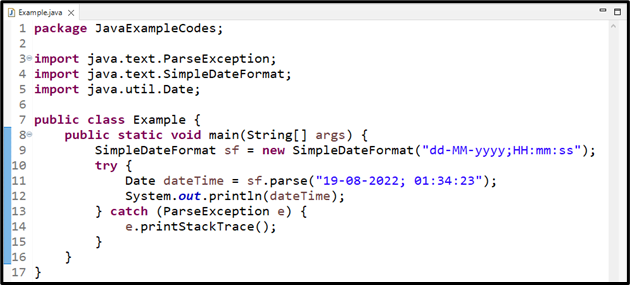This blog will explain the procedures for String to a DateTime object conversion in Java.
How to Convert String to DateTime Object in Java?
For converting a String to a DateTime object in Java, you can use:
- SimpleDateFormat class
- LocalDate class
- ZonedDateTime class
Let’s see how the mentioned classes help in converting a String to a DateTime object.
Method 1: Convert String to DateTime Object Using SimpleDateFormat Class
For converting a String to a DateTime object, you can use the Java “SimpleDateFormat” class. Using this class, a String can be parsed into the required DateTime object with the help of the “parse()” method.
Syntax
Here is the syntax of the parse() method of SimpleDateFormat class:
The “sf” is the object of the SimpleDateFormat class that invokes the “parse()” method by passing a String in a DateTime format.
Example
First, we will create an instance of the SimpleDateFormat class and pass a date and time format as parameter:
Use a try-catch block in which firstly you have to create an object of the “Date” class named “dateTime”. This object will store the date parsed as a String using the parse() method, and then prints the converted DateTime object with the “System.out.println()” method:
Date dateTime = sf.parse("19-08-2022; 01:34:23");
System.out.println(dateTime);
} catch (ParseException e) {
e.printStackTrace();
}
The given output indicates that the String is successfully converted into a DateTime object:
Now, let’s see how the LocalDate class works for converting a String to a DateTime object.
Method 2: Convert String to DateTime Object Using LocalDate Class
Another popular DateTime class in Java is “LocalDateTime”. The format of its object comprises “T”, which represents “Time” and acts as a point of separation between date and time.
Syntax
The below-given syntax can be followed to use the parse() method of the LocalDate class:
Here, the LocalDate class calls the “parse()” method by passing a DateTime String to convert it into a DateTime Object.
Example
We will first create an object of the LocalDateTime class named “dateTime” and parse the specified String argument with the help of the “parse()” method:
Finally, print the resultant “dateTime” object on the console:
Output
Method 3: Convert String to DateTime Object Using ZonedDateTime Class
Sometimes, we need time zone information with the DateTime. For this purpose, Java supports a class called “ZonedDateTime” that fetches the current time zones while working with date and time. This class also utilizes the “parse()” method with the ZonedDateTime Class to parse a string and convert it to a DateTime object.
Syntax
To use the ZonedDateTime class, follow the given syntax:
Here, the ZonedDateTime class invokes the “parse()” method by passing a String to be converted into a DateTime Object.
Example
Firstly, we will create an object of the ZonedDateTime class named “zone” and call the “parse()” method by passing a DateTime String in it as an argument. The specified string represents the date and time of the “America” time zone:
("2022-08-19T02:56:45.513464300-05:00[America/Chicago]");
Print the converted DateTime object:
As you can see, the converted DateTime object is displayed with the time zone information:
We gathered all the necessary information for converting a String to a DateTime object in Java.
Conclusion
For converting a string to a DateTime object, several ways in Java are used, such as the SimpleDateFormat class, LocalDate class, and ZonedDateTime class. These classes are a part of the Java.time and Java.util packages. For converting a String using these classes, execute the “parse()” method by passing a String as an argument. This blog explained the procedures to convert a String to a DateTime object in Java with proper examples.






